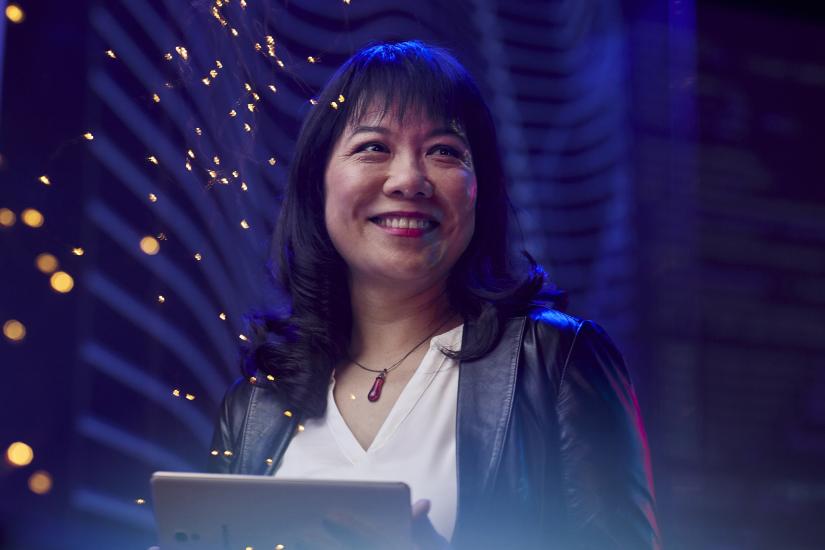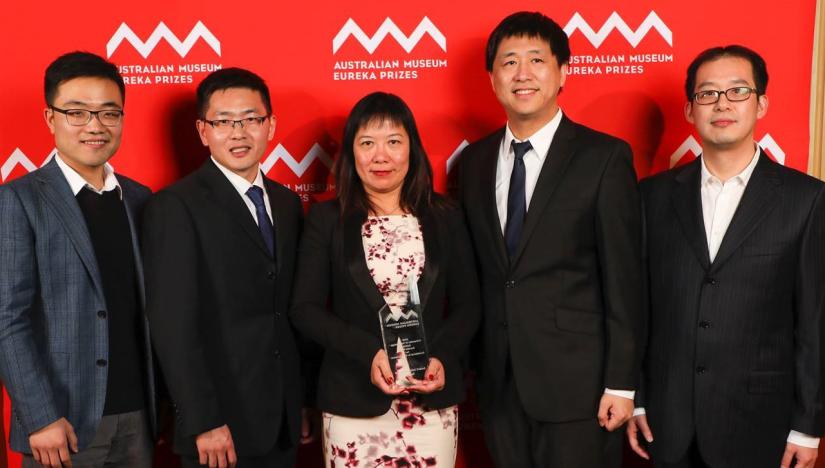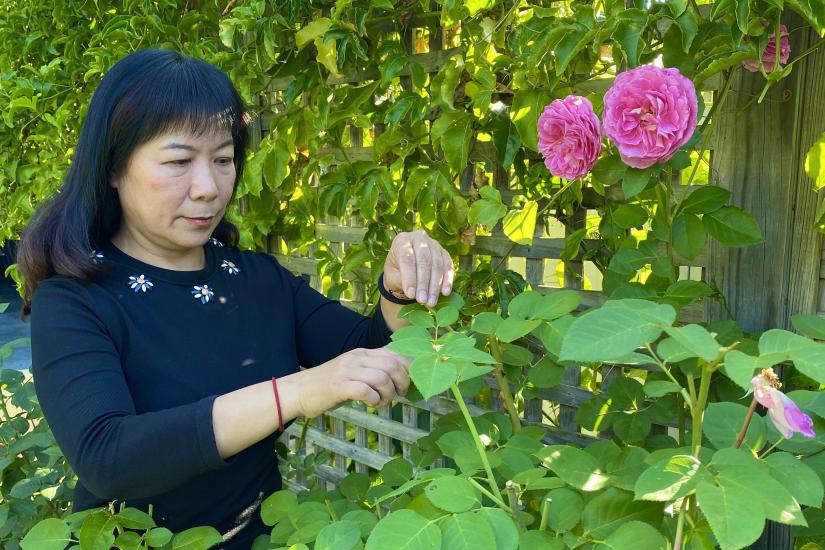Distinguished Professor Fang Chen, Executive Director of Data Science at UTS, is the winner of a 2021 NSW Premier's Prize for Science & Engineering – for Excellence in Engineering or Information and Communications Technology.

Fang Chen’s commitment to AI and machine learning began with her PhD in speech recognition and natural language processing. Photo by Toby Burrows
Fang Chen is an internationally recognised leader, researcher and innovator in artificial intelligence (AI) and data science. Her career milestones are significant: faculty dean in her 20s; Eureka Prize for data science; TED talk about AI to 5500 people; expert adviser to industry, government and academia.
She is not someone you'd expect to be journeying underground into Sydney’s sewers.
Yet Fang Chen has done that, by way of understanding the dangerous, dirty job of monitoring and maintaining the city’s ageing network of sewage and wastewater infrastructure, and the positive impact AI and machine learning algorithms could have.
“Within the next decade, AI will help a lot of industry to improve efficiency and get rid of some repetitive tasks, and help people to do tasks that are currently dangerous or impossible,” says Fang, who is the winner of the Australia and New Zealand ‘Women in AI’ in Infrastructure award for 2021.
Water supply networks constitute one of our most critical and valuable urban assets. The combination of growing population and ageing infrastructure networks require more advanced risk management and efficient operational strategies to maintain the infrastructure.
Fang Chen on why her work in infrastructure matters
“A dangerous example is our sewage system, where the environment is very bad. I'm lucky, I'm a researcher; I'm doing technology to try to help people. But some people have to row a boat or do other tasks inside the sewer – that's their job, to observe where you need to repair, where are the conditions going to deteriorate.
“For those sorts of situations, I'm very passionate – I think a lot of AI researchers are passionate as well – about how to protect humans, to use technology to do those jobs so you don't need to send human beings in there.”
Fang Chen and her colleagues have developed a tool, in use by Sydney Water, to detect leaks and plan maintenance to save water and avert water pipes failure.
Born in China, Fang Chen completed her PhD there before heading to the United States, where she made the leap from academia to industry. Technology company Motorola brought her to Sydney where she went on to work at NICTA and CSIRO before joining UTS. She says the depth of industry links at UTS is “one of the big reasons I chose to work here. Industry and academia are two mindsets working collaboratively.”

Fang Chen and colleagues celebrate their Australian Museum Eureka Prize in 2018. ‘I feel very, very proud. That's the top science award in the country, my Eureka moment.’
Her commitment to AI and machine learning began with her PhD in speech recognition and natural language processing.
“That's my starting point. It incentivised me to think a lot about what AI is and what we mean by understanding the human words.”
Not that we’re living in a true AI world just yet.
“Artificial intelligence, by definition, is machine intelligence which can mimic humans’ cognitive abilities – thinking and acting like a person, picking up suggestions like a person. In the current world, a lot of AI is actually what we call ‘narrow AI’. It is purely learning from data and finding the patterns.”
I love the moment when you try your best to convey some complicated topic to the general public – you have your research, you have your industry collaboration, but eventually it’s about the impact on people’s lives.
Fang Chen on delivering a talk at TEDxSydney
Fang Chen says there’s a lot of confusion in public opinion with people saying AI or robots are going to take over the world.
“Those conversations are coming from thinking the wide concept of AI will exactly mimic the human brain in complicated environments. The point is, that may come, but it's so long away – decades away. The simple reason is, how do you construct a common sense? Say, OK machine, learn some common sense? It’s hard enough getting humans to learn common sense.”
In March 2021, Fang Chen was announced as a member of the inaugural committee advising the NSW government on the use of artificial intelligence. She says the state government is taking leadership in this AI space and trying to be a role model for the whole country. “The committee will be focused on the use of AI for decision making and service delivery, as well as ethical AI policies.”

Fang Chen is a keen rose gardener, with at least 60 varieties in her Sydney garden.
Away from work, Fang Chen is an enthusiastic gardener, especially of roses – her Sydney garden boast 60 varieties, with Twilight Zone her favourite. She also likes to run and to put her creativity to work in the kitchen.
“Cooking is part of my innovation – throw different ingredients together, combine them differently, experiment.
“My best one for my background is my stir-fry – I pick any meat, any vegetables, and make a nice dish. You just throw the challenge to me, I can do it. If ever we have UTS MasterChef, I’ll be there.”
Distinguished Professor Fang Chen is Executive Director of the UTS Data Science Institute in the Faculty of Engineering and IT.
VISIT UTS DATA SCIENCE INSTITUTE
● Explore our research opportunities
● Explore our projects
● Partner with us

